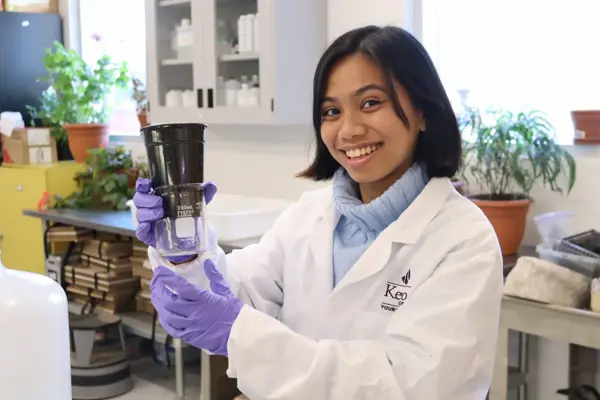Yes. Students may complete the diploma over an extended timeline.
The Environmental Technology program focuses on the environmental issues, problems and solutions that are associated with the natural resource industries of northern Alberta. This is a two-year diploma which develops the skills required for environmental positions with industry and government. The curriculum includes the necessary chemistry, biology and mathematics as it relates to the environment as well as environmental technology courses. Graduates from this program are eligible to apply to transfer to year 3 of a BSc degree at the University of Lethbridge.
What You’ll Learn
You will develop practical and scientific skills across the following areas:
- Environmental sampling, testing, and data analysis
- Plant and animal identification
- Water and soil quality monitoring
- Ecosystem management and land-use planning
- Environmental legislation and compliance
- GIS and geotechnical field techniques

Learning Outcomes (Post-Grad)
Graduates of the Environmental Technology Diploma will be prepared to:
✔️ Identify, collect, and analyze environmental data
✔️ Apply biological, ecological, and chemical principles to resource and environmental work
✔️ Operate GIS and geotechnical equipment
✔️ Assess environmental impact and land reclamation needs
✔️ Work within the framework of environmental laws and land-use regulations

Career Opportunities & Pathways
Start working in a wide range of fields such as:
- Environmental Technician
- Conservation and Reclamation Assistant
- Water Quality Technician
- Wildlife or Fisheries Technician
- Field Technologist
Program Structure
Fall Intake
Year 1
Term 1
-
BIOL 108 – Introduction to Biodiversity
-
CHEM 101 – Introductory University Chemistry I
-
EAS 100 – Planet Earth
-
ENVT 170 – Animal Identification
-
WRITE 103 – Scientific Writing
Year 1
Term 2
-
ENVT 163 – Water Quality
-
ENVT 165 – Geotechnical Sampling & Instrumentation
-
ENVT 268 – Resource Exploitation – Oil, Gas, Bitumen & Mining
-
GEOG 105 – Mapping, GPS, Remote Sensing, and GIS
-
STAT 151 – Introduction to Applied Statistics I
Year 2
Term 1
-
BIOL 208 – Principles of Ecology
-
CHEM 261 – Organic Chemistry
-
ENVT 252 – Regional Plant Identification
-
SOILS 210 – Introduction to Soil Science
-
SPCH 207 – Developing Professional Speaking Skills
Year 2
Term 2
-
EAS 208 – Introduction to Global Change
-
ENVT 262 – Environmental Laws & Land Rights
-
ENVT 265 – Forest Technology
-
ENVT 266 – Land Reclamation
-
ENVT 270 – Wildlife Management and Conservation
Admission Requirements
High School Admission
Applicants must hold an Alberta High School Diploma (or equivalent) and must have successfully completed:
- English 30-1
- Math 30-1
- Chemistry 30
- Biology 30
Mature Student Admission
Applicants must be at least 21 years old or out of school for three consecutive years. You may:
- Present the same high school course requirements above, OR
- Complete a College Entrance Assessment if you're missing required courses.
Contact an academic advisor to explore your options.
English Language Proficiency
If English is not your first language, you must meet one of the following minimum test scores:
- TOEFL iBT: 79 (no section below 19)
- IELTS: 6.0
- CAEL: 60
- MELAB: 80
- Duolingo: 95
- PTE Academic: 50
See the Credit Calendar for additional options.
Tuition and Fees
Duration: 2 years
Eligible for Domestic and International Students
| Tuition & Fees (2025–26) | ||
| Term | Domestic Students | International Students |
| Fall | $2,724.00 | $7,212.00 |
| Winter | $2,724.00 | $7,212.00 |
| Total | $5,448.00 | $14,424.00 |
Please note
- These estimates are based on 100% enrolment for all semesters and do not include mandatory laboratory fees. Laboratory fees can range from $35-$135 for 2025-2026.
- *Students will be charged a medical/dental benefit fee unless they opt out by demonstrating alternative coverage - deadlines can be found at StudentCare website.
** Tuition is due 10 business days before the start of each semester.
For more information view the Keyano College Credit Calendar.
Refunds, Withdrawals, and Deposits
For information about withdrawals, tuition refunds, program cancellations, and deposit policies, please refer to the Refund Policy page.
Frequently Asked Questions
Can I take this program part-time?
Is this program available to international students?
Yes. International students are welcome to apply. Please note that additional tuition fees apply.
Does this version of the diploma include a co-op or work placement?
No. This is the non-co-op version of the program and does not include a summer work term.
Are field trips part of the curriculum?
Yes. Many courses include field-based labs and trips in the Fort McMurray, Alberta area.
Begin your Journey Toward a Rewarding Environmental Career
Apply today or contact admissions for more information
